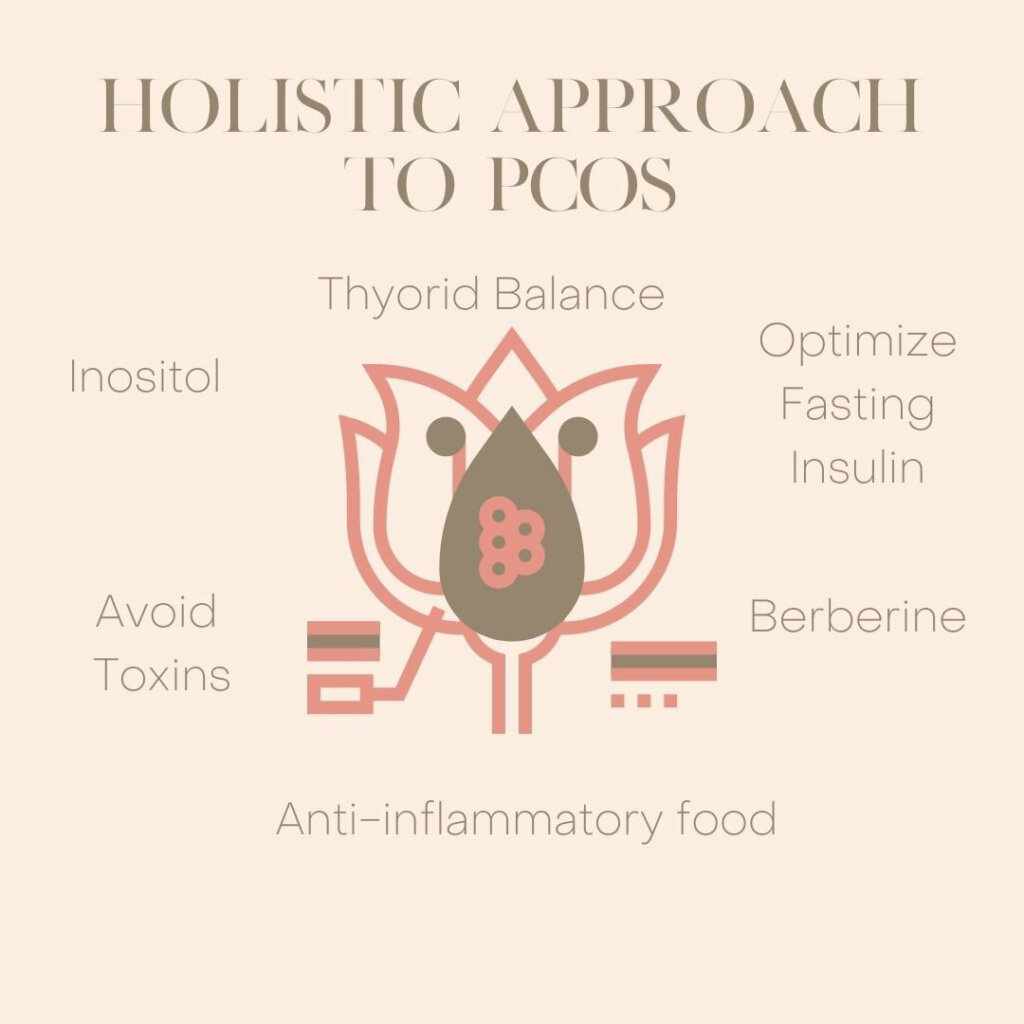Polycystic Ovarian Syndrome
Understanding PCOS and getting a clear diagnosis is half the battle. Let’s dive into understanding just how PCOS can impact your hormones and your health. The triad of characteristics of PCOS includes anovulation, hyperandrogenism, and insulin resistance. I’m going to breakdown these characteristics for you below.
Anovulation– is a term meaning no-ovulation. In PCOS, ovulation is often inhibited by higher levels of androgens (AKA. testosterone-like compounds). Without ovulation, women will experience hormone imbalances and may have irregular cycles.
- It is not uncommon that women will have regular cycles, like clockwork, every 28 days, but not have real periods. In these cases, there is no ovulation but the lining of the uterus is shed just as it is with a normal “period” but this is really just breakthrough bleeding. Ovulation is required for a true menstrual cycle.
- Hormonal imbalances exist because, without ovulation, the ovaries don’t produce progesterone, leading to unopposed estrogens or estrogen dominance. Thus symptoms of estrogen dominance can be present in addition to possible symptoms of androgen excess. Symptoms associated with estrogen dominance include; bloating, swelling of breasts, heavy periods, breast tenderness, water retention/swelling, decreased sex drive, mood swings, headaches, anxiety and panic attacks, and weight gain just to name a few.
Hyperandrogenism– high levels of androgens or testosterone-like hormones. These hormones include testosterone, DHEA, DHEA-S dihydrotestosterone, and androstenedione. These hormones are responsible for physical symptoms such as
- Loss of hair on the head, excess hair growth on the chin and upper lip or chest, thighs, and arms.
- Acne, especially jawline acne and deeper cystic type of outbreaks.
- Normal functions of the androgens support- bone health, muscle mass, libido, and fertility.

Insulin resistance– is a state where cells become less responsive to the messages of insulin to support the uptake of glucose into the tissues. When this happens the body’s pancreas must produce greater levels of insulin to support glucose uptake, which can eventually lead to diabetes. Signs of insulin resistance include
- Difficulty with weight loss
- Irregular blood sugar levels, feelings of fatigue, dizziness, brain fog.
- Weight gain in the belly and waist larger than 35 inches.
- Elevated fasting blood sugar, above 100 mg/dl
- Increased appetite and thirst.
- Elevated triglycerides, LDL, and possibly blood pressure.
You can see that PCOS is not a simple issue. With multiple hormonal systems involved from adrenal, pancreatic, and gonadal (sex hormones) it is important that each individual gets a clear diagnosis and a true understanding of the unique hormonal imbalances present in order to manage their health appropriately. It is then vital to focus on a holistic and comprehensive approach to wellness in order to help prevent disease progression and restore optimal health and vitality.
Testing recommendations
Talk with your naturopathic doctor about testing options to help learn more about your risks and understand your body better.
- Testosterone-free and total- looking at both levels will give a more comprehensive insight into testosterone’s impact.
- Dihydrotestonster and androstenedione
- DHEA and DHEA-S
- Lipid panel, comprehensive metabolic panel, fasting insulin
- Vitamin D
- Thyroid- comprehensive panel (TSH, fT4, fT3, TPO, reverse T3)
- Luteal phase progesterone
- Day 3 LH/FSH ratio
- Anti-Mullerian Hormone
- Salivary and urinary cortisol
With the lab results and comprehensive intake, your naturopathic provider can develop a plan that addresses your root causes of disease.

Important lifestyle factors to consider
We can not neglect food consumption.
The foods we eat impact our hormones on many different levels from our gut health, microbiome, hormonal balance, weight balance, and mental health. Eating food to support your unique health needs is a foundational change to help prevent disease and restore function in PCOS.
Sleep
The body needs sleep just as it needs food and that means good quality sleep. Ensure you’re getting enough sleep, at least 7 or more hours, ideally going to sleep before 11:00 PM at the latest on a regular basis. Our body has a circadian rhythm that closely follows the change in light from the sun, aim to mirror the light exposure in your home to match the changes from day to night, thus reducing night light exposure with candles and books vs screens and computers. In the morning you’ll want to get outside and turn on the lights to mirror the morning sunlight and help start your day to help boost your morning cortisol awakening response. Light and movement in the morning can help to bolster your cortisol to support wakefulness and energy.
Fasting
Our ancestors were not eating 16 hours a day. More often they probably had a very small feeding window. With modern conveniences, people are often fasting less than 12 hours per day. I recommend fasting for at least 12 hours and perhaps more if you’re working to support insulin sensitivity. Fasting helps the body to utilize sugar and thus improves insulin sensitivity. Talk with your naturopathic provider to develop a plan to support your time-restricted eating plan.
Toxins
Toxic chemicals can be found in the air we breathe, our car exhaust, our household cleaning products, and even our toothpaste. Many of these chemicals act as endocrine disruptors and should be avoided. They can also cause blood sugar irregularities and cause obesity and weight gain. A few simple steps to get started with green living include, learning about the Clean Fifteen and the Dirty Dozen, explore the Environmental Working Group’s Website and learn more about green living and the impact of toxic exposures, invest in great water filter and home air filter.
Move
It is important to move our bodies daily. We find ourselves sitting so often for work, commuting, and school that we lack the regular movement required for health. Aim to move for at least 30 minutes in addition to your daily activity. For PCOS it is especially important to include weight-bearing exercises (weight lifting and yoga for example) to your routine in order to maintain and build muscle mass which helps control blood sugar and improves insulin sensitivity. Get the support you need via a buddy, coach, or class, having positive support around you will help increase your chances for success.
Manage Stress
Stress can worsen adrenal hormone output namely DHEA-S and Cortisol, leading to worsened PCOS symptoms, and poor lifestyle choices. We can not avoid stress, and in fact, stress helps us grow stronger and more resilient. Find tools to manage stress is what is most important. I recommend engaging in activities that you enjoy. Not everyone is going to benefit from the same stress reducers. You might enjoy meditation, or perhaps you love dancing or gardening. These types of activities can be very helpful for combating stress. Do the things that help you feel more balanced and more like yourself.
Have a plan and a team of support
Managing PCOS without a plan can be an ever-changing and very difficult task. Jumping from one strategy to the next can lead to feelings of failure and confusion. Find a naturopathic provider to work with so you can develop a clear plan to support your success. You might consider developing a team of providers to help you navigate your health, a primary care provider, a nutritionist, a physical trainer, a yoga teacher, a therapist, and others who could all work together to develop a plan to leads you to new peaks of health and wellness.
Natural Therapies
There are so many different foods, herbs, and supplements that can be a huge benefit to support the many imbalances and underlying causes for PCOS. You’ll need to find the ones that are the best fit for you by working with your provider. Below you’ll see my baseline recommendations for supporting health and wellness.
Multivitamin and Mineral- a great daily vitamin will provide the necessary nutrients to help support your overall health and wellness.
Omega oil- a pure and potent omega-3 oil that can help balance inflammation levels and support the cardiovascular system.
Vitamin D- important for hormonal health and disease prevention. It is important to test, adjust the dose, and retest to ensure you get your levels into an optimal range. Read more about Vitamin D here
Inositol- inositol – B-vitamin like compound and one of the most beneficial supplements for PCOS. Inositol helps improve insulin sensitivity and also supports ovulation. With low risks or side effects, inositol is a safe and effective addition to most PCOS plans. Talk with your naturopathic provider to learn more about inositol. Learn more about the benefits of Inositol here.
Please share this article with your friends and loved ones to help increase awareness about PCOS. Click here to learn more about working with Dr. Guan to support your hormonal balance and optimal health.
You can use the link below to access Dr. Guan’s favorite ovarian supportive supplements.

Sources and Further Reading




